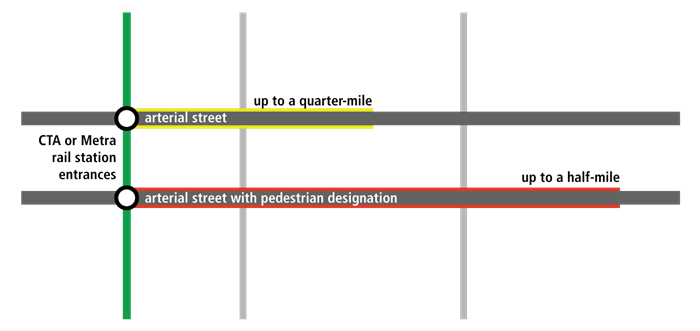This month, the Metropolitan Planning Council (MPC) unveiled Grow Chicago, a campaign to grow our city’s population by increasing the opportunity for housing and commercial development near public transportation. Transit-oriented development (TOD) is an effective and efficient growth strategy that limits congestion, reduces pollution, strengthens neighborhood economies and offers equitable access to opportunity. Our interactive website includes a Calculator that allows people to “design” a project and see how it will impact the surrounding community.
To realize the full growth potential of transit-oriented development, or TOD, MPC recommends the City of Chicago reform the zoning code to allow denser development with less parking near transit, identify a TOD “point person” in the City government who can shepherd major projects, and focus City funds on areas near transit. We also recommend the creation of a sustained civic collaboration to advance TOD across the region.
Today, the City of Chicago took a major step forward in accomplishing these goals. The office of Mayor Rahm Emanuel, who proposed and worked with City Council to pass a major TOD ordinance in 2013, unveiled a proposal for a reformed TOD ordinance that would accomplish many of the changes MPC is pushing for. The ordinance is likely to be reviewed by City Council at its September meeting.
An initial analysis of the ordinance conducted by MPC shows that the change would more than double the area of land benefiting from increased allowed density, compared with the 2013 ordinance, from 13 million sq. ft. of parcels to 31 million sq. ft. (this represents just a small portion of the city’s total developable area).
The ordinance would increase by more than 10 times the area that would benefit from reduced parking requirements, from 86 million sq. ft. of parcels to 957 million.
MPC also analyzed the proposed ordinance using the data provided by our TOD Calculator, which estimates benefits from new development. Our findings show that the ordinance, if passed, could result in the following benefits for the city of Chicago over the course of the next 20 years:
- A total of 60,000 to 70,000 new housing units located within a half-mile of our transit station on parcels affected by the ordinance, which is a roughly 50 percent increase over what would be possible without the ordinance. These units would house more than 100,000 residents.
- About 1,300 new affordable housing units located on site in new projects, as well as $150 million in funds transferred to the City of Chicago’s Affordable Housing Opportunity Fund.
- About $450 million in additional annual sales at neighborhood retailers, restaurants and stores located around Chicago.
- Additional annual tax revenues derived from property, sales and transfer taxes of almost $200 million, including $50 million for the City of Chicago, $15 million for our transit agencies and $75 million for City agencies, such as Chicago Public Schools and the Chicago Park District, as well as $50 million for Cook County, Metropolitan Water Reclamation District, Cook County Forest Preserve and the State of Illinois.
The ordinance provides these benefits by making the following zoning changes:
- For parcels zoned for business (B), commercial (C), downtown (D) or industrial (M) uses within a quarter-mile of rail stations or a half-mile of stations along streets designated by the city as pedestrian-oriented, an elimination of parking requirements, including for residential uses. Under the 2013 ordinance, residential uses were required to provide at least 1 parking space for every 2 housing units. This change reflects the fact that parking requirements significantly increase the cost of housing and is similar to a policy recently passed in Minneapolis.

Metropolitan Planning Council
The 2015 TOD ordinance would allow reduced parking requirements for developments on parcels up to a half-mile from rail stations.
- For parcels with floor area ratios (FAR) of 3 (roughly equivalent to three stories) in B, C and D zones within the aforementioned distance of transit stations, developments will be able to receive an upzone to a FAR of 3.5 if 2.5 percent of their housing units are affordable (the maximum under the 2013 ordinance), a FAR of 3.75 if 5 percent of their units are affordable, and a FAR of 4 if 10 percent of their units are affordable. This change offers the opportunity to build more space for people to live and work near our transit system.

Metropolitan Planning Council
Chicago's 2015 TOD ordinance offers additional density in exchange for affordable housing on site.
- The new change will allow both the elimination of parking requirements and the increase in development rights to occur through Administrative Adjustment, which means a faster and less costly approval process for developments. Under the 2013 ordinance, increases in buildable area required a time consuming and risky zoning map amendment.
MPC hails this proposed zoning ordinance as an important step forward in growing our city toward its transit system. We are excited to work with Mayor Rahm Emanuel, residents, businesses and community groups to encourage the passage of this ordinance, which we see as the first step toward a truly transit-oriented Chicago.